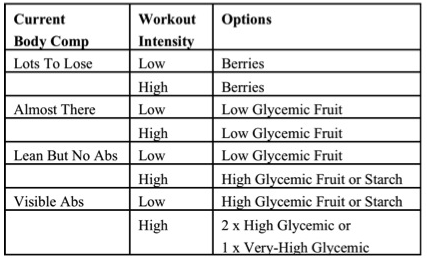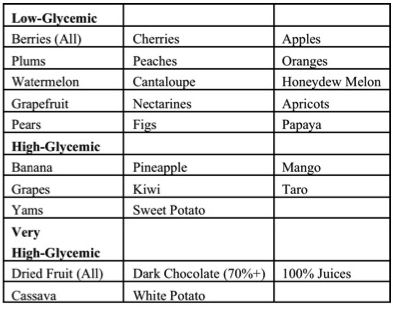The increased sensitivity of muscle tissue after exercise, means we ‘should’ eat protein and ‘can get away’ with eating carbohydrates. It doesn’t mean Lean Luke should be ingesting the same amount of carbohydrates as Fat Frank.
In fact, recent evidence has demonstrated that carbohydrate after exercise does not necessarily produce an additive effect (1, 2) on MPS (Muscle Protein Synthesis). And training with low muscle glycogen does not suppress the anabolic response, as researchers once thought it did.

In other words, the old school thinking that we need to jack up insulin and glucose post-workout to maximize exercise-induced muscular adaptations and facilitate repair of damaged tissue is no more. Since research has helped us understand that whey protein, and the essential amino acids that come with it, do a pretty sufficient job at stimulating MPS on their own.
Research from 2011 in the journal of Medicine & Science in Sports & Exercise looked at consuming 25g of whey protein on it’s own, or 25g of whey protein with 50g of added carbohydrates, and aside from a 5-fold higher increase in insulin, MPS and MPB at rest were no different.
Going back to our discussion from Live It NOT Diet!, this means those looking to lose fat are best sticking to lower-glycemic fruit options (or refraining from carbohydrates), as fat oxidation is elevated after post-workout. Whereas, those with ‘visable abs’ have the option of rewarding their exercise with higher-glycemic fruit, or waiting until their next solid meal to consume a starchy vegetable, like sweet potatoes.
Here are the reference charts from the book to refresh your memory:


(*Note: Dried fruits and juices are ‘very high-glycemic’ regardless of type)
For the elderly population that may be experiencing any level of anabolic resistance, sticking to lower-glycemic options is also highly encouraged – as extra carbohydrate provides no additional support for MPS, and refraining from excessive glucose will only help improve insulin sensitivity and fat oxidation going forward.

Yes, there is some research that suggests higher insulin levels may equate to less protein breakdown (1, 2, 3, 4, 5). But it’s clear that this is easily achieved with protein/amino acids (1, 2, 3, 4).
Evidence from 2008 in the American Journal of Physiology Endocrinology and Metabolism showed that only minimal concentrations of insulin (5mU/L) are required to maximally stimulate protein synthesis, and amounts easily satisfied by whey (30mU/L) necessary to reduce MPB.
In fact, research also shows that amounts greater than 30mU/L have no further inhibitory effect on muscle breakdown. Suggesting, that any more is likely unnecessary with respect to insulin and MPS, as the amino acids have a large enough impact on insulin to produce a positive change in net protein.
Thus, it seems the only reason we’d want to add carbohydrate is to further elevate glucose and insulin to replenish glycogen faster. And unless you’re training multiple times per day for extended periods of time (cardio), there’s not much to replenish. With most being lucky to burn through 20-25% of their muscle glycogen (1, 2) with the high-intensity resistance training recommended in 1% Fitness, and this glucose deficit (of approximately 80-100g) easily being replenished with a little bit of ‘good starch.’

Realistically, we don’t ‘need’ carbs post-workout to maximize gains in strength and muscle, and the only true ‘benefit’ appears to be glycogen resynthesis.
The administration of insulin in addition to amino acids increases muscle protein synthesis, but this is mainly attributed to the amino acids (hyperaminoacidemia).
And sure, it servers as a great reward after exercise (especially when it’s in the form of a piece of fruit or starchy tuber). And I’d highly encourage an above average reload for a lean, highly active individual (after an intense workout). But if you’re anything close to obese and insulin resistant, you’re better off adding some low-glycemic fruit (i.e. berries) to your post-workout protein, and taking an extra step towards NOT being obese and insulin resistant anymore.
Stay Lean!
Coach Mike
RELATED ARTICLES:
The 3 Ways to Prevent Muscle Loss
Why Carbs Are Best Consumed AFTER Exercise
Building Muscle? Do Post-Workout the Right WHEY
Exercise Intensity Trumps Exercise Duration For Disease Prevention
